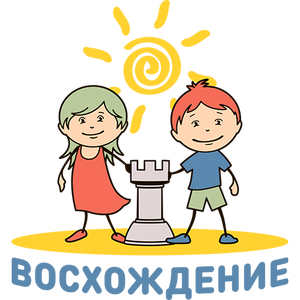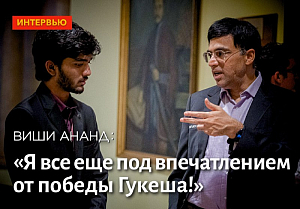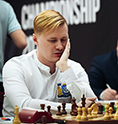Natalija Pogonina: We Have a Very Fun Autumn Ahead of Us
The two-time champion of Russia gave an interview to Eteri Kublashvili
- Natalija, congratulations on your victory! Let’s start with a traditional question: how was the tournament unfolding for you?
- Allow me to gather my thoughts (laughs). I started off with two games playing with the black pieces, where I won 1,5 points out of 2. So my start was decent. In the third round, I lost to Aleksandra Goryachkina. Overall, I lost two games in the tournament, the other one coming from Olga Girya. But I managed to gather myself after those losses: after my defeat in the third round, I won two games in a row- against Anastasiya Protopova and Alexandra Kosteniuk. After my loss to Olga, I drew against Anastasia Bondaruk and won three consecutive games after that, putting me in the race for first place. In general, I had only two fairly short games, while the rest finished after 8 pm. Overall, the tournament was difficult and the strain was tough.
- Which of your proffesional accomplishments can you highlight?
- I don’t like highlighting games; each one is special in its own way.
- In Satka, you played your third play-off for first place in the Russian championship. You lost the other two: how did you prepare yourself mentally for this one?
-Yes, I lost to Alisa Galliamova and to Aleksandra Goryachkina last year. This time, I felt much more competitive. Overall, the feeling preceding additional games was positive.
- You have worked with Pavel Lobach for many years. During the awards ceremony, his name was mentioned as your coach. Can you tell me if you have any other trainers?
- Yes, we still work together with Pavel. Here, he once again helped me and supported me. After the tournament, we haven’t had time to speak on the phone because I left mine in my room and my husband’s (Anatoly Pedashenko produces electronic boards which are well-known to many chess fans in our country- E.K.) ran out of battery. Because of this, we haven’t even spoken yet (this interview was recorded right after the closing ceremony of the Superfinal- E.K.)
With regards to other trainers, I can say that I have started working with another coach, but I do not want to share his name yet.
- For the first time, the Superfinal was held in a small town - Satka. What can you say about the organisation?
- In reality, the women’s championship was held in a small city once before- in Gorodets, in the Nizhny Novgorod Region in 2006. However, I didn’t play in it. But yes, the men’s championship is held in such a place for the first time.
I think the organizers have done everything well and they can be proud of themselves. When a small town is chosen to host the event, I think the organizers put in more effort. I have played in two super tournaments in Krasnoturyinsk- which is also in the Urals, but in its Northern part- and the organisation there was also fantastic. The city is small, but very welcoming. Satka was the same. Everyone tried hard to help us. Furthermore, I adored the opening ceremony. When small problems did arise, they were solved quickly. My only complaint is the air quality during one day, which was, to put it mildly, very strange because of the production.
My husband and I tried to take walks and visited the local forests and lakes that are close to the hotel. We had a good time. On our free day, we visited the Zyuratkul National Park- the lake there is gorgeous and the road leading up to it is very scenic. During our ride, our guide told us about the local legends, which we found highly interesting. I like spending time outside, so I signed up to the excursion with pleasure.
- How do you get on with cars? For several years now the winners of the Superfinal have received a Renault Kaptur, and now you have too.
- I don’t have a license (laughs). Everyone in the family drives: my husband, mother and father…I haven’t thought about it yet; when I get a car, I’ll consider it.
- What are your upcoming tournaments?
- We have a very fun autumn ahead of us. My schedule is as follows: a short trip home, then a training camp, the Olympiad, home for a day, the Russian blitz and rapid team championship in Sochi, then the European Cup in Greece and ten days later I will be going to the World Women’s Championship in Khanty-Mansiysk. So my schedule is full.
- How do you survive all this? How do you recover?
- I don’t know yet. I had something similar in 2016, and I did not survive that. I fell badly ill after a similar marathon. This time, I hope I will pay more attention to my health.
- How do you stay fit? Do you play any sport?
- I haven’t been able to do that recently. In the summer, my leg was recovering. But during the last training camp in Sochi, we walked for 8 km a day. Overall, I like walking and I feel much better after it. And yes, I sometimes do a morning fitness routine.
- How is the team feeling before the Olympiad?
- We’ll all gather at the training camp soon enough, and we’ll see what’s what. Of course, we feel determined to fight, but I don’t know what will happen in the end. The level of competition is, as ever, very high. Plus, we’ll be playing in Georgia and our hosts will want to win on their home turf. But we will fight to the end.
- The entire women’s team played in the Superfinal. So here you are competitors, above all else?
- Of course, here individual results matter above all else. But we are friendly towards each other, we share laughs together. There is nothing like “I don’t know you for the tournament.” We have a good team spirit and I hope we will be successful in Batumi.
- With regards to the women’s world championship, many people are unhappy with the format of the cycle. What is your opinion?
- The situation is strange, and there is certain disorder. Ideally, we would have the same system as men. Perhaps, we should replace the Grand Prix tournaments with something…I would love to see a women’s candidates tournament, but everything comes up against financing. Maybe we should eradicate a few Grand Prix events, so we would have more money for a candidates tournament. So, we would leave the World Cup and there would be a candidates tournament and the match in a two-year cycle. Right now, champions are changing too quickly: for example, ex world champion Tan Zhongyi won’t even play in this Olympiad.
- Thank you for sharing your opinion. We’ve spoken about your professional career. Tell us a little bit about your life outside chess. Do you live in Stavropol? What does your son do?
- Yes, we live in Stavropol, but I play for Saratov. My son is in third grade. He plays chess and he’s about to recommence training chess after the summer break. He is trained by Nastia- the sister of my husband- because he listens to her (laughs). He also plays badminton.
- How is the chess life in Stavropol?
- My husband occasionally organises tournaments and there are a few enthusiasts who hold competitions. But to be honest, things are a little quiet here, even if there have been a few positive developments. Saratov’s chess life is much more active: there are more chess players and there are more tournaments.
- Can you imagine yourself in a role of a chess functionary? For example, as chairperson of a regional federation?
- No, that isn’t for me. I like holding children’s tournaments: I have recently started to organise a small New Year’s rapid tournament. In Saratov, we had a competition for little girls, but most of the organisation was done by my trainer, Pavel Lobach. I only helped a little. I am more interested in organisation and logistics. For some reasons, I like it, but I don’t like to occupy a governing position.
- Natalija, thank you for the conversation. All the best and good luck!
- Thank you.
Photos by Eteri Kublashvili






















